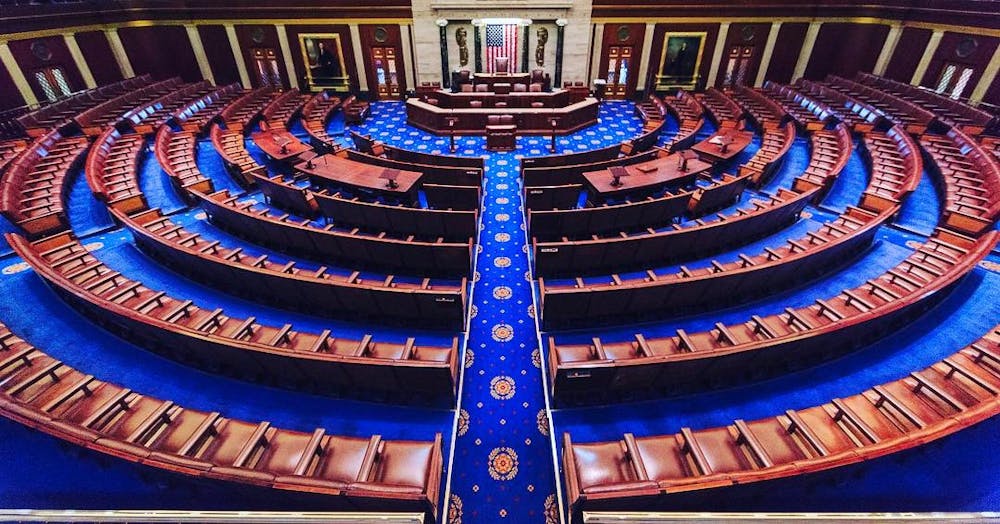By Brenden Kelley
Correspondent
The search for the new Speaker of the House ended after three long weeks. On Oct. 25, House Republicans elected Rep. Mike Johnson (R-La.) to become the new Speaker. In the days since Kevin McCarthy was voted out of the Speakers office, House Republicans made slow progress in the search for a new Speaker. According to the New York Times, Rep. Jim Jordan (R-Ohio) lost a secret vote on Oct. 20 to remain as the G.O.P. nominee for Speaker.
This comes after failed attempts by Jordan to gain the position of Speaker. Jordan hoped to rely on his longtime support of former President Donald Trump and his allies in Congress to carry him to the position of Speaker. Several Republicans who had refused to support Jordan were reported to have received credible death threats due to not supporting Jordan’s bid for speaker. While Jordan had denounced these threats in a social media post, the damage done by these threats eliminated any chance of Jordan becoming the Speaker.
Rep. Drew Ferguson (R-Ga.) who had originally supported Jordan stated, “When the pressure campaigns and attacks on fellow members ramped up, it became clear to me that the House Republican Conference does not need a bully as the Speaker.”
Johnson was one of nine Republicans who had announced they were running for Speaker of the House following Jordan’s removal as the nominee. The other nominees included Rep. Tom Emmer (Minn.), Rep. Kevin Hern (Okla.), Rep. Pete Sessions (Texas.), Rep. Austin Scott (Ga.), Rep. Byron Donalds (Fla.), Rep. Jack Bergman (Mich.), Rep. Mike Johnson (La.), Rep. Dan Mueser (Pa.) and Rep Gary Palmer (Ala.).
Johnson was an unlikely candidate to assume the role of House Speaker. Johnson has a record of being a hardliner for conservative issues. According to the New York Times, Johnson has been an outspoken opponent of abortion care and called homosexuality “inherently unnatural.” Johnson was also one of the key figures in the efforts to overturn Joe Biden’s victory in the 2020 Presidential Elections.
Rep. Matt Gaetz (R-Fla.) commented on Johnson’s nomination on social media, stating that Johnson “won’t be the Speaker the Swamp wants but, he is the Speaker America needs.”
Trump also supported Johnson, stating that he would be “fantastic speaker” and that he had not heard “one negative comment about him. Everybody likes him.”
On the other side of the aisle, Democrats continued to support Rep. Hakeem Jeffries (D-N.Y.) as their nominee for House Speaker. Jeffries, the current House Minority Leader, has said there were no serious discussions with Republicans about forming a coalition to elect a new Speaker.
One possible solution that was proposed during the search that would have allowed Congress to return to their normal duties was to give the Speaker Pro Tempore, Rep. Patrick Henry (R-N.C.), the ability to bring legislation to vote. The Speaker Pro Tempore was created following security concerns raised by the 9/11 attacks in the event that the Speaker of the House was killed or unable to fulfill their duties. Henry interpreted this role as only allowing him to carry out elections for the next Speaker, and according to the New York Times, most Republicans were against the idea of giving Henry the power to bring legislation to the floor.
Without a Speaker, the House was put at a standstill, preventing important legislation such as the White House’s request for a $105 billion aid package for both Israel and Ukraine to help with their ongoing conflicts, from being passed.
With the search for Speaker of the House at a close, it is uncertain what the division displayed by House Republicans during the election process means for the future of their party. With the election of Mike Johnson as the new Speaker of the House, it is clear that Republicans have been moved significantly further to the right.







